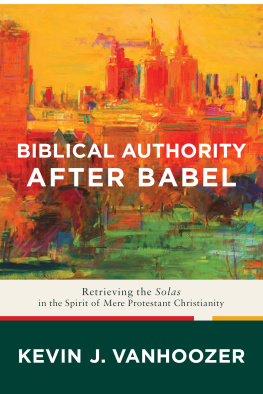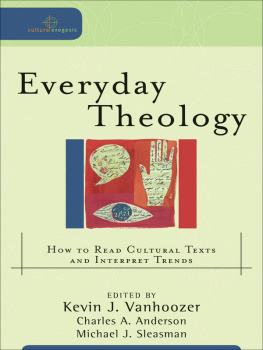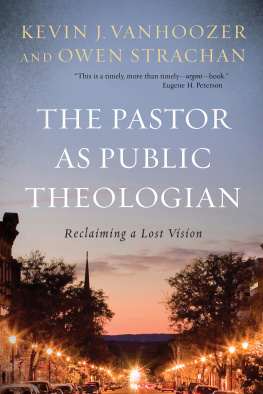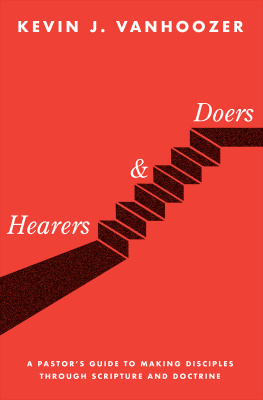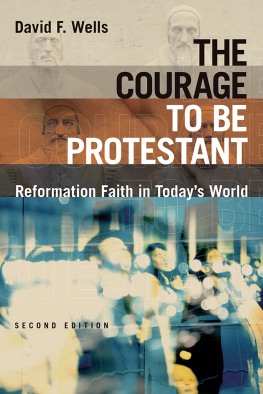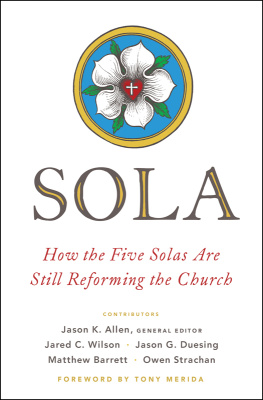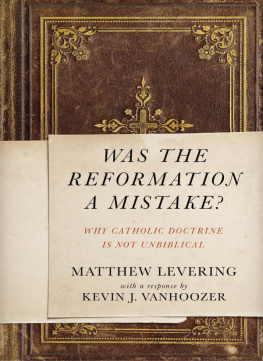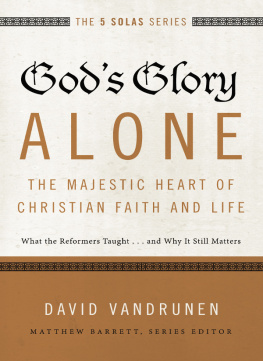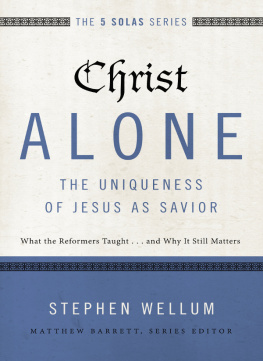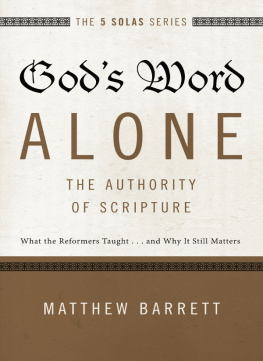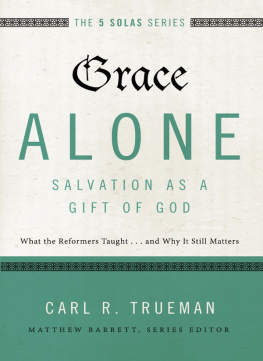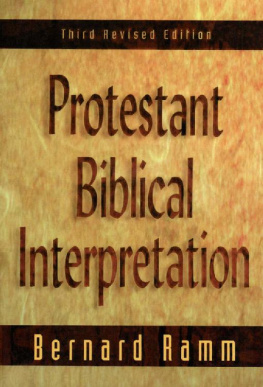Contents
Cover
Title Page
Copyright Page
Endorsements
Dedication
Preface
Introduction: Should the Church Repent or Retrieve the Reformation? Secularism, Skepticism, and SchismOh My!
By Their Fruits Ye Shall Know Them: Assessing a Revolution
Narrating the Story of Protestantism
Repenting the (Unintended) Iniquities of Our Reformation Fathers
Fine-Tuning the Problem; Deepening the Dilemma
Always Retrieving? Ressourcing the Debate about Interpretive Authority
Why Mere Protestant Christianity Matters
1. Grace Alone: The Mere Protestant Ontology, Economy, and Teleology of the Gospel
Sola Gratia: What the Reformers Meant
Nature and/or Grace: Other Views
Triune Ontology and the Economy of Salvation
Sola Gratia for Bible, Church, and Interpretive Authority
2. Faith Alone: The Mere Protestant Principle of Authority
Sola Fide: What the Reformers Meant
Faith and/or Criticism: Other Views
The Principle of Authority
Sola Fide for Bible, Church, and Interpretive Authority
Sola Scriptura: What the Reformers Meant
Scripture and/or Tradition: Other Views
The Pattern of Authority
Sola Scriptura for Bible, Church, and Interpretive Authority
4. In Christ Alone: The Royal Priesthood of All Believers
Solus Christus: What the Reformers Meant
Christology and Ecclesiology: Other Views
The Royal Priesthood
Solus Christus for Bible, Church, and Interpretive Authority
5. For the Glory of God Alone: The Wealth of Holy Nations
Soli Deo Gloria: The Lords Supper as a Test of Christian Unity
Church Unity: Other Views
Communion in the Church (and between Churches)
Soli Deo Gloria for Bible, Church, and Interpretive Authority
Conclusion: From Catholic Protestantism to Protestant Evangelicalism
And in the Morning, It Was Leah!
Protestant Evangelicalism: A Marriage Made in Heaven?
After Babel, Pentecost: The Households of God and the Spirit of Mere Protestant Christianity
The Gospel Alone: The Solas in the Pattern of Protestant Evangelical Interpretive Authority
Bibliography
Scripture Index
Subject Index
Back Cover
Preface
Experience is not the primary norm for Christian theology, but events often serve as catalysts or occasions for theologizing. I was awakened from my pre-dogmatic slumbers one summer by a curious incident while ministering in southern France. I was there for a summer in partial fulfillment of my seminary internship requirement. The local pastor with whom I was working accompanied me to the march , the weekly open-air market that is a staple of every town in Provence. We set up a bookstall with standard Christian literature: Bibles, Gospels of John, and assorted evangelistic tracts. Most people ignored us: it was hard to compete with freshly picked apricots, herbes de Provence , and ripened wheels of Camembert. Time passed, until eventually a man approached. Bonjour, monsieur!
The man thumbed through some of our pamphlets, checked the sign over our booth identifying us as an glise Libre (Free Church), and then said something unexpected: Alors, vous tes anarchiste? (So, youre an anarchist?). Several things went through my mind: first, did I hear him correctly; second, he wouldnt be saying that if he knew my parents; third, if only my college friends could see me now! Seeing my surprise, he proceeded to set out what I would later discover was a customary Roman Catholic objection to Protestantism: The Roman Catholic Church has a head [Gk. arch ], a figure of authority who directs the body and says what the Bible means. You Protestants lack such a figure: you are headless [Gk. an + arch = without a head/ruler]hence, anarchists.
The man in the march was the first to alert me to the perceived parallel between the Protestant Reformation and the babble that followed Babel (Gen. 11:9): both were events that apparently resulted in more rather than less confusion. The implication of his remark was that the Reformation resulted in a confusion not of languages but of interpretations, authorities, and interpretive communities. I dont remember how I responded that day, though I do recall being eager to complete my seminary training so that I could pursue this and other questions, such as: What does it mean to be biblical? Who can say, with authority, what the Bible means? How can the Bible have authority after interpretive Babel ? How should Bible-believing Christians navigate the conflict of church interpretations?
My doctoral studies provided a second catalyst for this book. I will never forget the way Henry Chadwick, the Regius Professor of Divinity, peered at me over the rim of his glasses as I concluded my dissertation proposal hearing at the end of my first year at Cambridge University. I had gone to England to pursue further my life question: What does it mean for Christian disciples and theologians to be biblical? Professor Chadwick sighed, then rendered his judgment with classic British understatement: Mr. Vanhoozer, Im afraid that topic has been studied before. Indeed.
The problem of competing claimants to the mantle biblically authorized is older than Protestantism itself. Yet, for the reasons we will examine in this study, the Protestant Reformation exacerbated the problem, fanning scattered embers into a raging fire that engulfed the whole of European Christianity. The ashes are still smoldering. As arborists know, the impact of a fire on a forest depends on the forests condition, and opinions differ on whether this conflagration was purely destructive or produced more ecological good than harm. Sola scriptura continues to generate much heat, but few would go so far as to describe the Reformations effect on the church as a controlled burn. On the contrary: the conflict of interpretations that has divided the church resembles a wildfire that is still only 10 percent contained.

